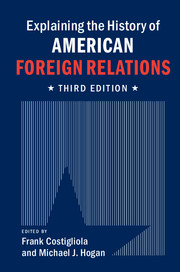Book contents
- Frontmatter
- Dedication
- Contents
- List of figures
- List of contributors
- Introduction
- 1 Theories of International Relations
- 2 National security
- 3 Corporatism: from the new era to the age of development
- 4 Explaining political economy
- 5 Diplomatic history after the big bang: using computational methods to explore the infinite archive
- 6 Development and technopolitics
- 7 Nonstate actors
- 8 Legal history as foreign relations history
- 9 Domestic politics
- 10 The global frontier: comparative history and the frontier-borderlands approach
- 11 Considering borders
- 12 The privilege of acting upon others: the middle eastern exception to anti-exceptionalist histories of the US and the world
- 13 Nationalism as an umbrella ideology
- 14 Nation Branding
- 15 Shades of sovereignty: racialized power, the United States and the world
- 16 Gendering American foreign relations
- 17 The religious turn in diplomatic history
- 18 Memory and the study of US foreign relations
- 19 The senses
- 20 Psychology
- 21 Reading for emotion
- Index
10 - The global frontier: comparative history and the frontier-borderlands approach
Published online by Cambridge University Press: 05 March 2016
- Frontmatter
- Dedication
- Contents
- List of figures
- List of contributors
- Introduction
- 1 Theories of International Relations
- 2 National security
- 3 Corporatism: from the new era to the age of development
- 4 Explaining political economy
- 5 Diplomatic history after the big bang: using computational methods to explore the infinite archive
- 6 Development and technopolitics
- 7 Nonstate actors
- 8 Legal history as foreign relations history
- 9 Domestic politics
- 10 The global frontier: comparative history and the frontier-borderlands approach
- 11 Considering borders
- 12 The privilege of acting upon others: the middle eastern exception to anti-exceptionalist histories of the US and the world
- 13 Nationalism as an umbrella ideology
- 14 Nation Branding
- 15 Shades of sovereignty: racialized power, the United States and the world
- 16 Gendering American foreign relations
- 17 The religious turn in diplomatic history
- 18 Memory and the study of US foreign relations
- 19 The senses
- 20 Psychology
- 21 Reading for emotion
- Index
Summary
“This trip into the Amazon would help to understand the real potential of Fordlandia: if it were all just an enormous glass container, a cavity made of precious crystal, into which an eccentric millionaire had poured his eccentric dreams; or if, in fact, it really was a pioneering adventure whose goal was to raise the flag of progress in an unknown territory, as unknown as it was beautiful, never to leave.”
“So, don't you think, then, that to tamper with Eden is to destroy it?”
Eduardo Sguiglia's novel Fordlandia, the source of these two quotations, is a fictionalized account of the rubber plantation established by Henry Ford in the jungles of Brazil. Ford's errand into the Amazon wilderness served a dual purpose. He sought to establish a source of raw rubber for automobile tires other than British-dominated Malaya, while inculcating “backward” peoples with the work ethic and the faith in material progress that characterized Fordism. Ford regulated life in his self-named company town with a giant clock, whose piercing whistle imposed time discipline over the indigenous workforce, just as he hoped that social dancing and proper hygiene would uplift the natives. But Fordlandia was not the success its sponsor envisioned. A clash between Anglo managers and the diverse workforce of Indians and Afro-Caribbean migrants assembled by the company, as well as a rubber-tree blight, doomed Ford's adventure into the twentieth-century global frontier.
Historians of American foreign relations are better positioned than ever before to offer cutting-edge interpretations of the issues raised by Fordlandia in ways that can match the brilliance of Sguiglia's literary treatment. Successive calls for methodological innovation have prompted scholars to borrow from political science, cultural studies, and other disciplines. They have studied nonstate actors and marginalized groups and introduced race, culture, ideology, postmodernism, literary criticism, and gender into their analyses. But these new approaches to US foreign relations have only begun to provide comparative perspective on the American experience in the world and challenge the exceptionalist assumptions that have long been associated with the field. Recent scholarship on borderlands and frontiers, however, offers historians valuable insight into the nature of cultural encounters and shifting cultural identities, the fringes of states’ political authority, and the integration of the human and natural resources of peripheral areas into larger systems of economic exchange.
- Type
- Chapter
- Information
- Explaining the History of American Foreign Relations , pp. 168 - 187Publisher: Cambridge University PressPrint publication year: 2016
- 2
- Cited by



